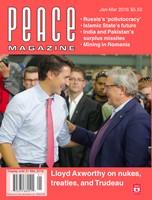
Peace Magazine Jan-Mar 2016, page 5. Some rights reserved.
Just on the eve of the Paris Climate Conference (COP 21) and the coming discussions on climate change and a sustainable world society, Maurice Strong died on 29 November 2015. More than any other person in the United Nations system, he had been the driving force to put the environment on the “world agenda.”
In 1971 the UN secretariat started planning for the Stockholm conference in Geneva in the Palais Wilson, the original League of Nations headquarters. The head of the preparatory secretariat was Maurice Strong, who became the Secretary General of the Conference itself.
Strong was a Canadian who had made money early in his business life and thus could devote the rest of his life to UN-related activities. He was an intense, self-motivated person with a high regard for people in non-governmental organizations who would try out new ideas. He launched what has become an institution with UN conferences: a parallel conference held a few days earlier in the same city with representatives of NGOs — now called “civil society” — who write a statement of what governments should say if they had the intelligence and courage of NGOs.
The 1972 Stockholm Conference led many governments to create a “Ministry of Ecology” or a sub-section of an existing ministry. The United Nations created the UN Environment Program (UNEP), of which Maurice Strong was the first director.
After his retirement from UNEP, Strong continued to be a strong voice for ecological action. He was secretary general of the Rio Conference on 1992, often called the “Earth Summit,” which started to popularize the idea of sustainable development. Maurice Strong is in many ways the model of the world citizen, deeply rooted in his Canadian experience and open to the world, an active agent at the world level for ecologically-sound development.
René Wadlow
Geneva, Switzerland
Prime Minister Trudeau has ordered the cessation of Canada’s bombing efforts in Syria, but a continuation of training local fighters. Both approaches are problematic.
Bombing kills and injures innocent civilians, which in turn leads yet more violent jihadists to seek revenge.
Since a war cannot be won through bombing but only through the actions of ground forces, in theory at least training of local Iraqi and Syrian forces should be a more productive role for Canada. In practice, however, problems abound. The Americans to date have spent about US$500 million on training local, so-called moderate Syrian fighters with shockingly abysmal results: namely a total of four or five fighters trained and with countless American-supplied weapons ending up in extremist hands in the process.
Training of Kurdish Peshmerga, which Canada is already doing, may yield better fighters but not a stronger Iraq. The Kurds want an independent Kurdistan, about which our NATO ally, Turkey, has grave concerns. Then there are the disturbing allegations of human rights abuses by Kurdish forces.
And we have precious few Iraqi Sunnis to train since, in their stronghold of Anbar province, Sunni tribes have largely chosen ISIS as the lesser of two evils over the Iraqi government’s use of Iranian-backed Shia militias as its main fighting force against ISIS.
Bombing Islamic State and training local fighters is doing little to end the civil war in Syria. But without an end to that war, ISIS cannot be effectively contained. Canada, then, needs to throw its support wholeheartedly behind the UN-facilitated peace negotiations with all but the most hardline Syrian factions, and the Vienna process of the so-called Syrian Support Group, which finally includes virtually all of the external backers of the various warring factions, including Russia and Iran.
Peggy Mason
Former Canadian Ambassador for Disarmament to the UN and President of the Rideau Institute on International Affairs.